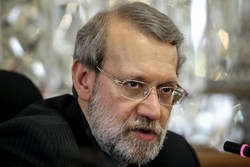 Iranian Parliament Speaker Ali Larijani warned that the move by some Arab and Muslim states to normalize relations with Israel is a dangerous policy, urging Iraq to play a constructive role in preventing some countries from undertaking such measures.
Iranian Parliament Speaker Ali Larijani warned that the move by some Arab and Muslim states to normalize relations with Israel is a dangerous policy, urging Iraq to play a constructive role in preventing some countries from undertaking such measures. RNA - “Normalization of ties between Islamic-Arab countries and Israeli regime is dangerous,” Larijani said on Tuesday in a meeting with President of the Iraqi Supreme Council of the Judiciary Faeq Zidan in Tehran.
Larijani underscored the role of Iraq in this issue saying, “Iraq plays a significant role in this regard since the existing problems among Islamic countries should not lead them into making peace with Israel.”
The top lawmaker noted that despite all efforts of the US to divide the Iranian and Iraqi nations, all their measures in this regard have been defused.
For his part, the Iraqi official said that Iraq will never let enemies implement their plans, reiterating that Baghdad will stand by Tehran.
He described normalization of Islamic countries’ relations with Israel as a major danger in the region adding, “The recent Manama conference, held to promote this purpose, was defeated but the US will not stop its efforts in this regard.”
“We must not remain silent,” he said.
“Normalization of relations with Israel is the red line of Iraq and a type of committing suicide due to religious issues and matters of beliefs,” he underlined.
Underscoring reinforcement of Iran-Iraq economic ties, Zidan said, “Enemies try to impede such relations via imposing maximum pressure on Iraqi central bank in order to stop its cooperation with Iranian companies.”
Late in last month, Advisor to the Iranian Parliament Speaker Hossein Amir Abdollahian, in a post on his Twitter page, reminded Bahraini Foreign Minister Khalid bin Ahmed al Khalifa that the monarchy must listen to its people and stop being puppeteered by Tel Aviv and pro-Zionists.
According to Fars News Agency, Amir Abdollahian lashed out at Khalid bin Ahmed al Khalifa for executing dictated Israeli policies in the region.
Reconcile with your people and don't execute dirty policies of others in the region. Otherwise, Al Khalifa will fall as the “Deal of the Century” ceases to be valid. Zionists have no place in the future of the region, the former deputy foreign minister reiterated.
On June 30, Bahrain’s main Shia opposition group, al-Wefaq National Islamic Society, lashed out at the country’s foreign minister for urging open communication with the Tel Aviv regime, dismissing his remarks as “reckless".
In this year edition of international Quds Day rallies in Iran, the partiicpants issued a final communique where they condemned the dependence of some “reactionary leaders” of the Arab world who are after normalizing relations with Israel, and the “so-called economic American Zionist meeting of Manama”.
847/940